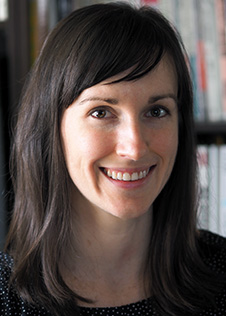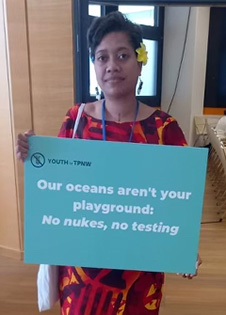As war and climate change bring nuclear issues back to the forefront of global conversations, a group of activists, artists and researchers are set to discuss how to achieve a nuclear-free future at a conference this month.
Nuclear Connections Across Oceania, organised by students and staff at the University of Otago's Te Ao O Rongomaraeroa National Centre for Peace and Conflict Studies and Kā Rakahau o Te Ao Tūroa Centre for Sustainability, will run over 25 and 26 November.

Dr Karly Burch.
Co-organiser Dr Karly Burch, Research Fellow at the Centre for Sustainability, says events in Ukraine and ongoing legacies of uranium-derived nuclear pollution have highlighted the clear need for critical global discussions on how we will collectively address nuclear imperialism, nuclear colonialism and their material consequences.
“We need to be centring the experiences of people from the Pacific, a place which has long served as the 'nuclear playground' for many imperial nations. Given its particular nuclear history and anti-nuclear policies and culture, Aotearoa provides a unique context for hosting critical conversations on nuclear issues,” she says.
A key goal of the free online and in-person conference is to create a space where people can come together to learn about nuclear issues, build relationships, and strategise how to best address the material consequences of nuclear imperialism and nuclear colonialism.
“It is important that we do not reproduce colonial or other uneven power relations as we try to address nuclear issues. It is particularly important for settlers, such as myself, to be aware of the power we have and to use it to support the efforts of Indigenous peoples and others on the front lines working for nuclear and climate justice.
“We will need to build relationships to do this work, which is why connection-building is one of the main themes of our conference,” Dr Burch says.
The keynote speaker is Hilda Halkyard-Harawira, founding member of the Pacific Peoples Anti-Nuclear Action Committee and co-organiser of the first Te Hui Oranga o Te Moana Nui a Kiwa in 1982. Te Hui Oranga o Te Moana Nui a Kiwa were reciprocal conferences where Māori and Pacific Nuclear Free and Independent Pacific activists gathered to address the consequences of nuclear imperialism and nuclear colonialism in the Pacific.
The conference has received funding from a number of organisations including the Peace & Disarmament Education Trust, Quakers Peace and Services Aotearoa New Zealand, Aotearoa New Zealand Peace & Conflict Studies Centre Trust, the University of Otago's Office of Pacific Development, and the Rotary Club of Mount Victoria.
These funds are supporting several connection-building activities, such as setting-up regional conference hubs across Oceania and bringing Pacific youth activists to Aotearoa to speak at the conference.
Many of these Pacific guests will be presenting in the Pacific Voices session which will bring together critical, creative and frontline advocates through the spirit of “Wansolwara”, a Tok Pisin term meaning “one salt water” or “one ocean, one people”. Speakers in this session will explore trans-Indigenous historical and contemporary movements for self-determination, decolonisation and demilitarisation of Wansolwara, which they view as indivisible from the fight for a nuclear-free region.

Mere Tuilau is an anti-nuclear advocate, human rights defender, facilitator, and youth leader from Fiji who initiated the forming of the Pacific Youth for TPNW in 2022. Mere will be contributing to the conference's “Pacific voices” session and “Stopping the wastewater discharge at TEPCO's damaged Fukushima Daiichi nuclear power plant” panel. Photo: Supplied.
Other highlights of the programme include:
- An Indigenous peoples caucus which will be gathering during afternoon tea on both days of the conference.
- A panel of Māori and Pacific speakers discussing a range of issues related to nuclear politics. Panellists will draw links between historical and current nuclear events, and connect ongoing trajectories of nuclear imperialism and nuclear colonialism to issues such as climate change, development, and sustainability.
- A panel of Pacific and Japanese speakers discussing the urgent need to stop the Japanese government's plans to discharge/dump wastewater from Tokyo Electric Power Company's (TEPCO's) damaged Fukushima Daiichi nuclear power plant into the Pacific Ocean.
- Sessions including first- and second-generation hibakusha (atomic bomb survivors) from Hiroshima.
Dr Burch says it has been about 11 years since nuclear issues last filled news headlines with the onset of TEPCO's Fukushima Daiichi nuclear disaster, and 40 years since the first meeting of Te Hui Oranga o Te Moana Nui a Kiwa.
“I'm excited our conference will bring together such a wide range of people from across Oceania and the globe. I am particularly excited about our workshopping session at the end of the conference. This will be an opportunity for speakers and audience members to deepen their connections and translate some of the knowledge they have gained at the conference into concrete actions.”
Event details and registration
Friday, 25 November 2022 to Saturday, 26 November 2022, online and in-person at St Margaret's College, University of Otago.
RSVP by 11:59pm, 14 November NZDT to confirm your participation in morning tea, lunch and afternoon tea.
For more information, contact:
Dr Karly Burch
Centre for Sustainability
University of Otago
Tel +64 3 479 9242
Email karly.burch@otago.ac.nz
Ellie Rowley
Communications Adviser
University of Otago
Mob +64 21 278 8200
Email ellie.rowley@otago.ac.nz
Find an Otago expert
Use our Media Expertise Database to find an Otago researcher for media comment.